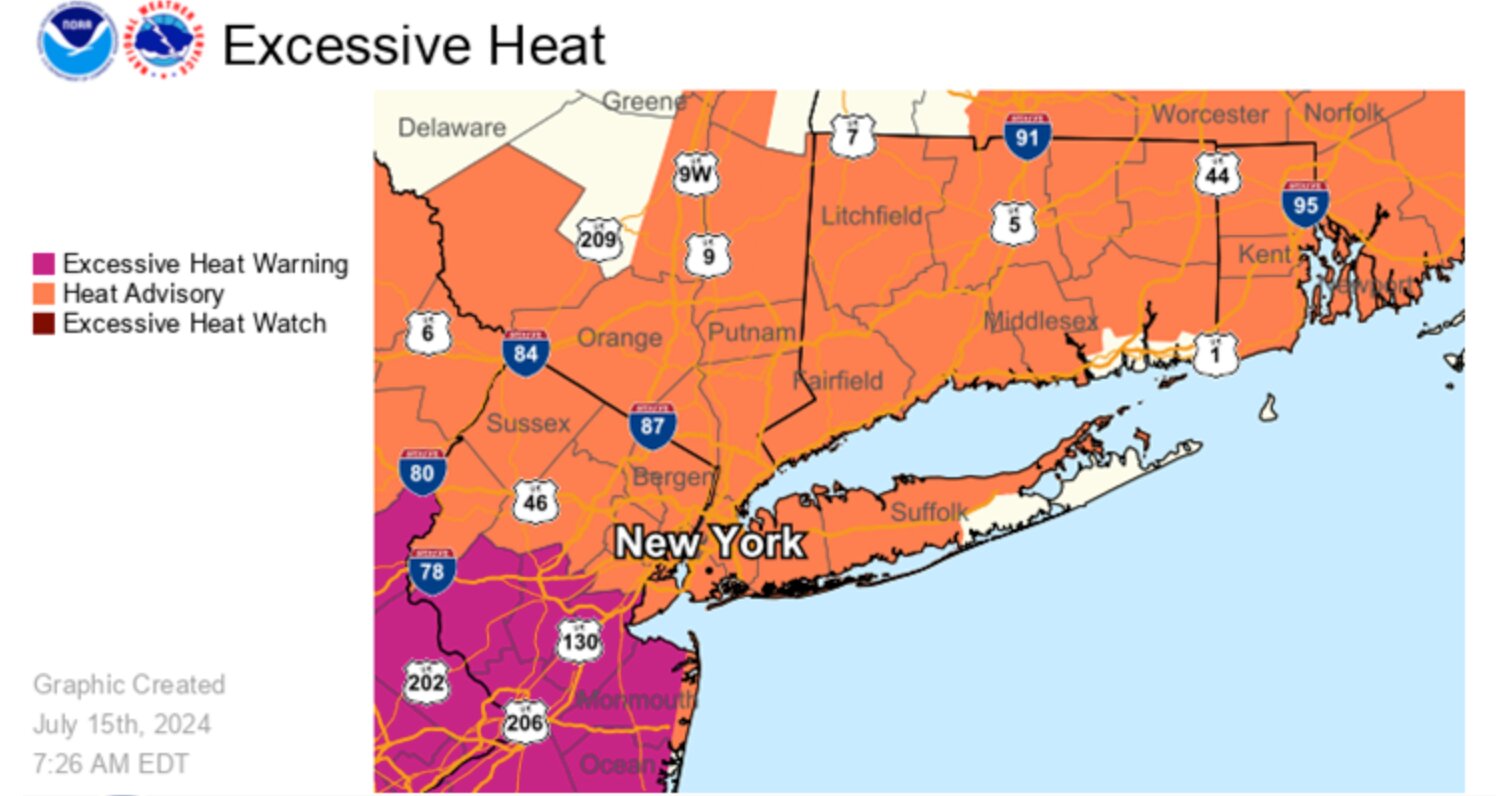Thursday, August 22, 2024
Heat advisory issued for the region
Posted

Kathy Hochul, Governor
By Ben Fiebert
Governor Kathy Hochul updated New Yorkers on Monday about the excessive heat and high humidity impacting the region .
Temperatures on Monday and Tuesday are likely to bring dangerous feels like temperatures between 95 and 104 across the entire state. Long Island, also has a marginal risk for severe thunderstorms Monday afternoon into Monday evening. Air quality health advisories for ozone are also in effect for Long Island on Monday from 11 a.m. to 11 p.m. For a complete listing of weather watches, warnings, advisories and latest forecasts, visit the National Weather Service website.
“New Yorkers should take precautions to stay cool and stay safe as the combination of severe heat and high humidity will pose a significant health risk,” Hochul said. “I encourage New Yorkers to stay hydrated, take advantage of free pool access at our beautiful State Parks, and plan ahead to cool off during this time.”
Pools and beaches at New York State Parks are available for swimming. Hochul has waived entry fees at New York State Park pools this summer. Prior to making a trip, visitors should call ahead to the park they plan to visit or check the website for any updates as weather and water conditions may affect swimming status. Park status updates are also available on the free New York State Parks Explorer mobile app for iOS and Android devices.
The Home Energy Assistance Program can provide an air conditioning unit to income eligible households that include someone with a documented medical condition exacerbated by extreme heat, or households with young children or older adults. Applications will continue to be accepted until funding runs out. For more information, visit the Office of Temporary and Disability Assistance website or contact your local office for the aging at 1-800-342-9871.
Information about what you can do during hot weather can be found on the Department of Health’s Extreme Heat website. You can also locate cooling centers close to you here.
No matter your age, what kind of shape you are in, or what health conditions you have, the dangers of extreme heat can affect everyone. The body works extra hard to maintain a normal temperature during extreme heat and, without taking proper measures, this can lead to heat-related illness or even death.
Groups most at risk are:
- People who work outdoors or indoors without air conditioning
- Adults aged 60 years and older
- Infants, children, and those who are pregnant
- People with chronic health conditions
- Those with physical and cognitive disabilities
- Those with no access to air conditioning
- Individuals who live alone or are unhoused
- Athletes
- Pets and service animals
- People living in cities because asphalt and concrete store heat longer and release heat more slowly at night. This produces higher nighttime temperatures and is known as the "urban heat island effect.”
Never leave children and pets unsupervised in hot cars. There is a real and severe danger when leaving children or pets unsupervised in a car even when temperatures don’t “feel” hot. At 60 degrees outside, after just one hour a closed car can get as hot as 105 degrees.
Report an inappropriate comment
Comments
HELP SUPPORT LOCAL JOURNALISM
The worldwide pandemic has threatened many of the businesses you rely on every day, but don’t let it take away your source for local news. Now more than ever, we need your help to ensure nothing but the best in hyperlocal community journalism comes straight to you. Consider supporting the Herald with a small donation. It can be a one-time, or a monthly contribution, to help ensure we’re here through this crisis. To donate or for more information, click here.
Sponsored content
Other items that may interest you
© 2024, Richner Communications
·
2 Endo Blvd
·
Garden City, NY
·
(516) 569-4000






